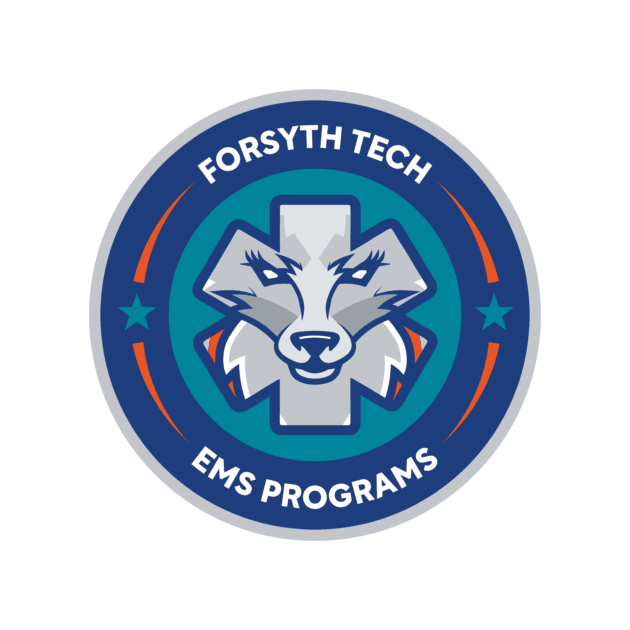Our EMS programs are designed to provide students with the foundation and skills to enter the Emergency Medical Services profession. Whether you’re interested in starting your EMS career with Emergency Medical Responder (EMR) and Emergency Medical Technician (EMT) courses or looking to advance your skills with Advanced-EMT and our new EMS Paramedic Academy, we have something for everyone.
In addition to our certification programs, you can also pursue an Associate in Applied Science Emergency Medical Science Degree through our EMS bridging program. We also offer specialty courses tailored to meet the needs of our community partners and surrounding EMS agencies. Explore our program and come join us at Forsyth Tech and take the first step towards a rewarding career in EMS!
Why choose Forsyth Tech EMS Programs?
At Forsyth Tech EMS programs, our mission is to equip future EMTs and paramedics with the highest quality training to ensure they are prepared to handle real-world emergencies with confidence and competence. Our goal is to produce skilled, compassionate, and professional emergency responders who are ready to serve their communities effectively.
Our program meets the national registry and North Carolina state standards for EMR, EMT, Advanced-EMT, and paramedic training. We achieve this through a comprehensive approach that combines theoretical knowledge with practical application. Students learn essential skills through detailed demonstrations, virtual reality (VR) simulated experiences, lab practice and extensive hands-on practice and scenarios. All training is conducted by our team of credentialed, highly qualified EMS professional educators who bring a wealth of experience and expertise to the classroom.
At Forsyth Tech, we make it simple to get started and advance your career.
Step 1: EMT Certification
- EMS 110: This is a credit-based course for students enrolled in a college program.
- EMS 4200: This is a continuing education course, perfect for those who want a non-credit option.
Step 2: Move to Advanced EMT or Paramedic
- Advanced EMT Program (EMS 4300): This standalone program is offered through continuing education and builds on your EMT skills.
- Paramedic Academy: If you prefer, you can skip Advanced EMT and go straight into the Paramedic Academy. This program starts every January, and applications are accepted from March to July unless otherwise noted.
Step 3: For Current Paramedics
If you’re already a certified paramedic and want to earn an Associate Degree in Emergency Medical Science, you can enroll in our EMS Bridging Program.
Degrees & Certificates
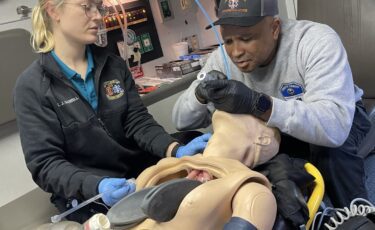
EMS Bridging Program
Associate Degree in Applied Science
Time to Complete:
1 – 3 semesters
Schedule:
Online and In-person
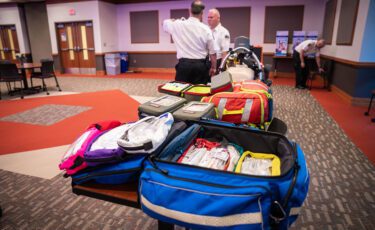
Advanced EMT (AEMT)
Certificate
Time to Complete:
4 – 6 months
Schedule:
Day, evening and weekend classes
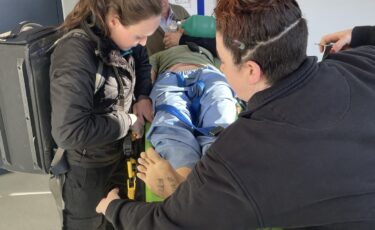
EMT
Certificate
Time to Complete:
8 – 16 weeks
Schedule:
Day, evening and weekend classes
Earning your EMT Basic Certification provides you with the foundational knowledge and practical skills needed to start a career in emergency medicine. You’ll learn about medication and patient care while gaining valuable experience through hands-on experience. Students graduate ready to enter the workforce, or continue their education to become a paramedic.

Paramedic Programs
Certificate
Time to Complete:
10 – 12 months
Schedule:
Day, evening and weekend classes
The Forsyth Tech Paramedic Academy is an intensive 10-12 month program that rigorously prepares students through classroom instruction and clinical experience. Paramedics are trained to perform advanced procedures like IVs, intubation, cardiac monitoring, and administering medications, ensuring graduates are ready for the demands of emergency medical services.
Available Courses
| Course Title | Location | Start Date | End Date | Information |
| EMT Initial (CE) | Northwest Forsyth Campus | 6/2/2025 | 8/15/2025 | Course Meets Monday, Wednesdays and Fridays 8 am – 4:30 pm Registration Deadline 5/9/2025 at 5 pm Mandatory Orientation 5/12/2025 3 pm – 5 pm |
| Hybrid AEMT to Paramedic Bridge Part 1 | Northwest Forsyth Campus | 7/1/2025 | 11/6/2025 | This course is offered in a “”flip-flop”” format, allowing students to choose to attend in-person classes on either Tuesday or Thursday. In addition to in-person sessions, students are required to complete online assignments and lectures. Successful completion of both in-person and online components is necessary to graduate from the course. Students must complete part 1 and part 2 to graduate from the course (There are two specific dates listed on the schedule where students will need to attend class on an alternate day due to the college being closed for holidays. Be sure to review the schedule carefully for these adjustments). Class will run from 8:30 AM to 5:00 PM, with a 1-hour lunch break from 12:00 PM to 1:00 PM. The mandatory information session (orientation) will be held on June 10, 2025, at the Northwest Forsyth Campus, located at 3111 Big Oaks Dr., King, NC 27021. Room details will be provided to all applicants who are invited to attend. |
| Hybrid AEMT to Paramedic Bridge Part 2 | Northwest Forsyth Campus | 11/10/2025 | 4/16/2025 | This course is offered in a “”flip-flop”” format, allowing students to choose to attend in-person classes on either Tuesday or Thursday. In addition to in-person sessions, students are required to complete online assignments and lectures. Successful completion of both in-person and online components is necessary to graduate from the course. Students must complete part 1 and part 2 to graduate from the course (There are two specific dates listed on the schedule where students will need to attend class on an alternate day due to the college being closed for holidays. Be sure to review the schedule carefully for these adjustments). Class will run from 8:30 AM to 5:00 PM, with a 1-hour lunch break from 12:00 PM to 1:00 PM. |
| EMS Officer 2 – Logistics | Northwest Forsyth Campus | 4/12/2025 | 4/13/2025 | Course meets 8 am – 5 pm To Register Email Catherine Hill: chill@forsythtech.edu |
| EMS Officer 2 – Administration | Northwest Forsyth Campus | 5/10/2025 | 5/11/2025 | Course meets 8 am – 5 pm To Register Email Catherine Hill: chill@forsythtech.edu |
| EMS Officer 2 – Operations | Northwest Forsyth Campus | 6/14/2025 | 6/15/2025 | Course meets 8 am – 5 pm To Register Email Catherine Hill: chill@forsythtech.edu |
| EMS Officer 2 – Compliance | Northwest Forsyth Campus | 7/12/2025 | 7/13/2025 | Course meets 8 am – 5 pm To Register Email Catherine Hill: chill@forsythtech.edu |
| EMT Initial 4200/110 Combo | Northwest Forsyth Campus | 8/18/2025 | 12/17/2025 | Course meets Monday, Wednesday and every other Friday from 9 am – 3:50 pm Contact Michael Belcher for more information: mbelcher@forsythtech.edu |
| EMS-280 EMS Bridging Course | Online Asynchronous | 8/18/2025 | 10/13/2025 | Contact Michael Belcher for more information: mbelcher@forsythtech.edu |
| Paramedic Academy 2026 | Northwest Forsyth Campus | Spring TBD | Spring TBD | Application Process Opens 4/1/2025 and will end on 8/1/2025 For More Information Email Michael Belcher at mbelcher@forsythtech.edu |
| NC EMS Leadership Academy Session 1 | Forsyth Tech Main Campus Strickland Center- Rhoades Conference Center | 11/5/2025 | 11/9/2025 | The leadership academy is held in two 40-hour sessions. Session 1: Will occur from November 5 – 9, 2025 from 8a – 6p and Sunday from 8a – 12p. Session 2: Will occur from May 27 – 31, 2026, from 8a – 6p and Sunday from 8a – 12p. Must Attend Both Sessions to Graduate For More Information email Michael Belcher: mbelcher@forsythtech.edu |
| NC EMS Leadership Academy Session 2 | Forsyth Tech Main Campus Strickland Center- Rhoades Conference Center | 5/27/2026 | 5/31/2026 | The leadership academy is held in two 40-hour sessions. Session 1: Will occur from November 5 – 9, 2025 from 8a – 6p and Sunday from 8a – 12p. Session 2: Will occur from May 27 – 31, 2026, from 8a – 6p and Sunday from 8a – 12p. Must Attend Both Sessions to Graduate For More Information email Michael Belcher: mbelcher@forsythtech.edu |
| EMT Initial 4200/110 Combo | Northwest Forsyth Campus | Spring TBD | Spring TBD | Contact Michael Belcher for more information: mbelcher@forsythtech.edu |
| EMS-3163 Basic Anatomy & Physiology | Online Asynchronous | 7/3/25 | 9/21/25 | Contact Michael Belcher for more information: mbelcher@forsythtech.edu |
Career Tracks
- Emergency Medicine Technician (EMT)
- Private and public EMS agencies
- Fire-Rescue Departments
- Hospitals
- Urgent Care Centers
- Doctors Offices
- EMS Training Programs
Specialty EMS Courses
Specialty EMS Courses
NAEMT’s Prehospital Trauma Life Support (PHTLS) is a leading global program for prehospital emergency trauma care. Its mission is to promote excellence in trauma management and improve outcomes by fostering critical thinking and emphasizing the unique needs of multisystem trauma patients. PHTLS courses enhance care quality and reduce mortality, empowering EMS practitioners to make informed decisions.
The course utilizes the internationally recognized PHTLS textbook and covers the following topics:
Physiology of life and death
Scene assessment
Patient assessment
Hemorrhage control
Airway
Breathing, ventilation, and oxygenation
Circulation and shock
Special population
The EVOS course addresses the knowledge gap behind injuries and fatalities, focusing on changing behaviors to promote a culture of safe driving. Using current research, case studies, and crash analyses, EVOS encourages EMS practitioners to rethink vehicle safety. Instructors can also tailor the curriculum to include local laws and policies.
Topics covered in the course include:
Making driving safety a priority
Legal aspects of EMS vehicle operation
Maneuvering an EMS vehicle
Vehicle inspection and maintenance
Mental, emotional and physical preparedness
Emergency response
Crash prevention
Driving skills
Technological aids
Simulation training
AMLS is the gold standard for emergency medical assessment and treatment education, endorsed by the National Association of EMS Physicians. It teaches students to use the AMLS Assessment Pathway to quickly and accurately manage common medical conditions. Through realistic case-based scenarios, students practice scene size-up, first impressions, history-taking, and differential diagnosis. The fourth edition includes over 75 patient simulations, with added features like simulation monitor images and ECGs from iSimulate to enhance the learning experience.
The course utilizes the AMLS textbook and course manual, and covers the following topics:
Pharmacology
Respiratory disorders
Cardiovascular disorders
Shock
Sepsis
Neurologic disorders
Mental health emergencies
Endocrine/Metabolic disorders
Environmental emergencies
Infectious disease
Abdominal disorders
Women’s health emergencies
Toxicologic emergencies
This course equips clinically competent EMS professionals with the knowledge, resources, and skills to effectively teach EMS education. It covers a range of topics, including learning psychology, classroom management, ethics, and student and course evaluation. Focusing on instructional preparation, presentation, and evaluation, the course reflects the consensus on essential skills needed for high-quality EMS education programs.
At the conclusion of the course, students will, at minimum, be able to:
Organize and prepare materials for presentation;
Prepare instructional aids;
Determine the equipment and materials needed to teach specific curriculum courses;
Evaluate student performance and provide corrective feedback to improve subsequent student performance;
Develop a mechanism for evaluating the effectiveness of an EMS educational program;
Select curriculum materials appropriate to the level of course being taught, and effectively deliver each lesson contained in an EMS curriculum, as measured by overall student performance on course objectives.
Prepare course outlines, lesson plans, course schedule and instructor schedules
$50,000
Average yearly salary range
6.5 %
Job growth
308
Job Openings
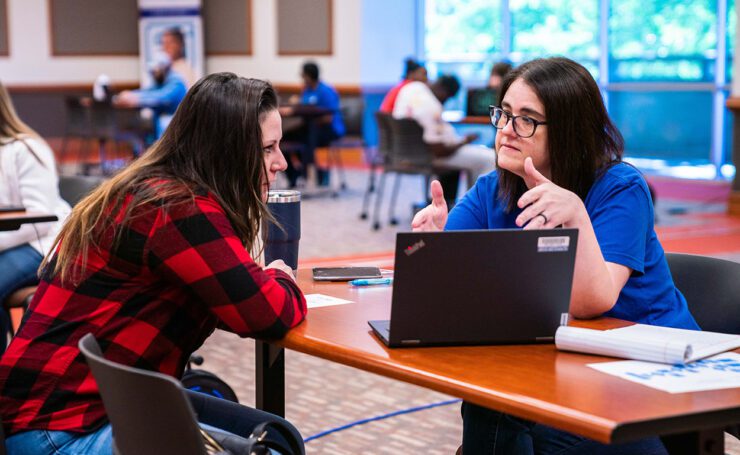
Get the education you deserve without spending your days worrying about how to afford it. Our financial aid team can help you chart a path to paying for college, including through debt-free grants and scholarships.

The Forsyth Tech Cares program supports students so they can succeed, including access to financial assistance, health services, and confidential counseling.
Need More Information?
For more information, please contact the EMS Program Director, Michael Belcher, at mbelcher@forsythtech.edu.
Visit us today!
Forsyth Tech’s Northwest Center is located at:
3111 Big Oaks Drive,
King, NC, 27021
